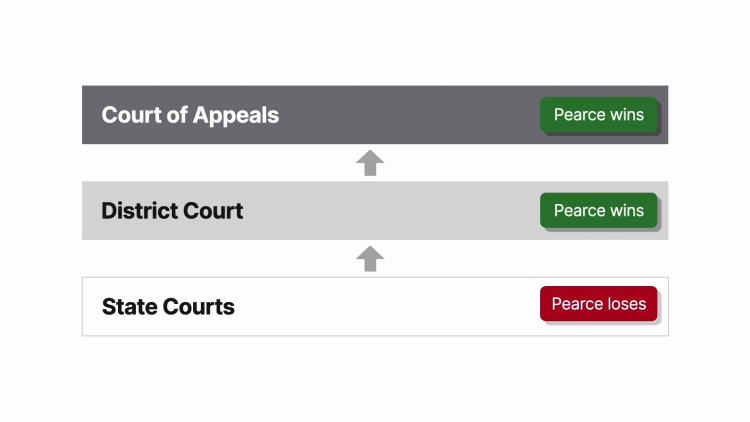North Carolina v. Pearce
United States Supreme Court
395 U.S. 711, 89 S.Ct. 2072, 23 L.Ed.2d 656 (1969)

- Written by Richard Lavigne, JD
Facts
Pearce (defendant) was convicted of criminal charges in the state courts of North Carolina. Pearce was sentenced to a term of 12 to 15 years in prison. Several years after his conviction, Pearce’s conviction was reversed and he was afforded a new trial. Pearce was reconvicted at the new trial and given an eight-year prison sentence. The state court would not grant credit for time already served. The new sentence, combined with time already served, amounted to a longer prison term than the original sentence. Pearce appealed and the federal district court and court of appeals held that the longer sentence was unconstitutional. The state of North Carolina petitioned the United States Supreme Court for review, and Pearce’s case was consolidated with the case of Rice. Rice pled guilty to criminal charges in the state courts of Alabama and was sentenced to 10 years in prison. Rice was retried after his original convictions were vacated. At the new trial, Rice was convicted again and sentenced to a total of 25 years in prison. Rice was not granted credit for time served. Rice appealed and both the federal district court and court of appeals held that the longer sentence was unconstitutional. The state of Alabama petitioned the United States Supreme Court for review.
Rule of Law
Issue
Holding and Reasoning (Stewart, J.)
Concurrence (White, J.)
Concurrence (Douglas, J.)
Concurrence/Dissent (Harlan, J.)
Concurrence/Dissent (Black, J.)
What to do next…
Here's why 904,000 law students have relied on our case briefs:
- Written by law professors and practitioners, not other law students. 47,100 briefs, keyed to 995 casebooks. Top-notch customer support.
- The right amount of information, includes the facts, issues, rule of law, holding and reasoning, and any concurrences and dissents.
- Access in your classes, works on your mobile and tablet. Massive library of related video lessons and high quality multiple-choice questions.
- Easy to use, uniform format for every case brief. Written in plain English, not in legalese. Our briefs summarize and simplify; they don’t just repeat the court’s language.





